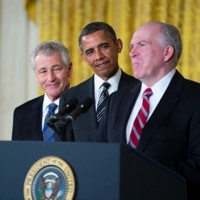It was odd to listen to foreign policy pundits comment on President Barack Obama's inaugural address. Some announced that the administration had all but conceded that Iran will obtain a nuclear capability, and that Israel is being left out to dry. Others speculated that in his second term Obama will work to catalyze a broad-based Pacific alliance to counterbalance a rising China. There were those who argued that the second inaugural signals an expansion of the so-called drone war and use of special operations forces to deal with threats to the United States. Some read in Obama’s remarks a call for strategic restraint and a renewed focus on domestic development at the expense of foreign policy. Others concluded that this president believes in the use of American power to reshape the world, he is merely more cautious and judicious than his predecessor.
Having listened to these various and often contradictory assessments of what the president meant, I had to go back to reread the text of Obama's address, to make sure that I hadn't missed some critical detail. A thorough examination of the speech revealed no mention of Iran, China, drones, terrorism, al-Qaida or Israel. It was not a long oration, and foreign policy issues encompassed but a few lines. While not wishing to give offense to the president or his speechwriters, the address covered no new ground, but merely revisited themes -- and in some cases even tag lines -- used during the campaign and in speeches given since the election.
Obama stressed again the importance of finding new and alternative sources of energy to power American recovery. He renounced "perpetual war" and offered the olive branch of resolving "differences with other nations peacefully," but he did not eschew the "strength of arms" to defend the United States. And he offered the usual invocations about America's global leadership, his desire to spread democracy and his commitment to a network of American-linked alliances that span the globe. It followed the usual "and/but" circumlocutions that have become common in presidential rhetoric in recent years: a hedging that commits the president to no one course of action and gives proponents of different policies, even within his party and his own administration, hope that their own view or preferred policy is still being considered. In short, every option is still on the proverbial table.

